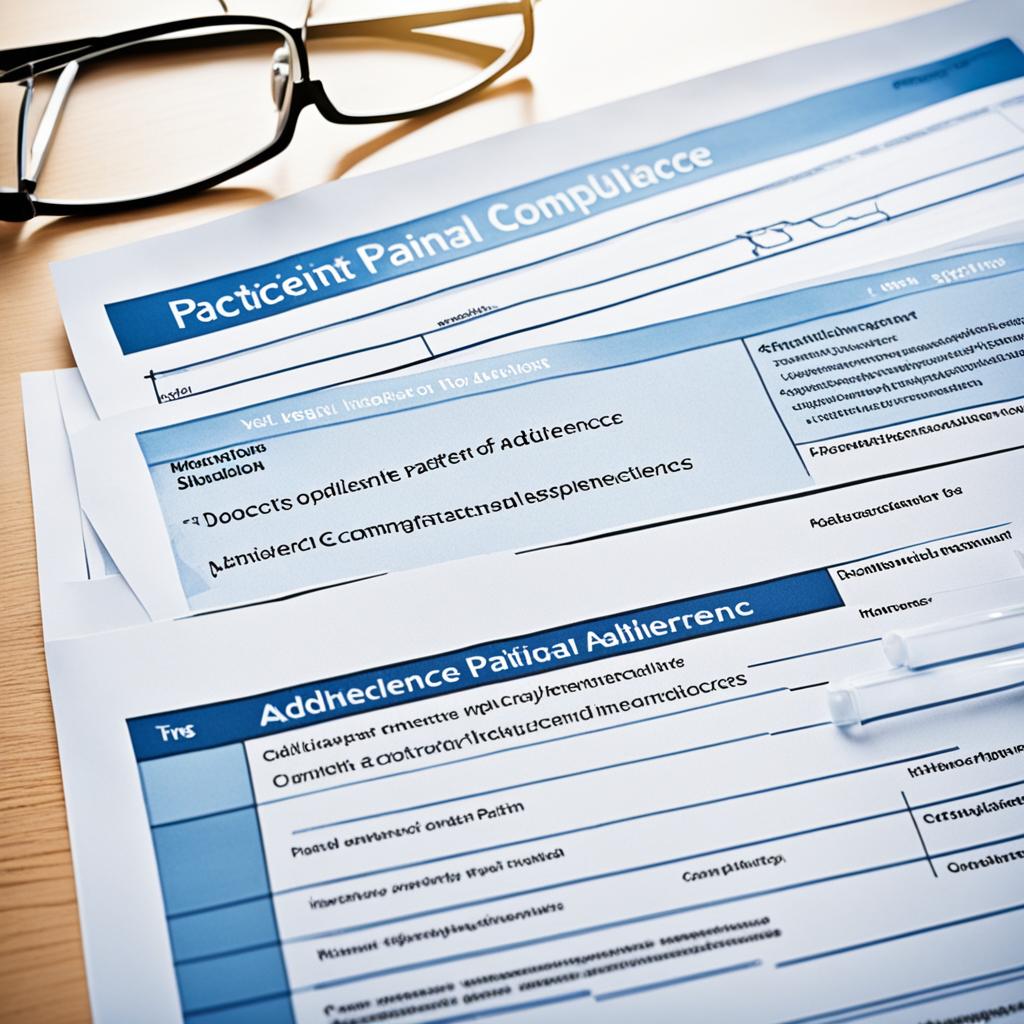As experts in the field of healthcare, we are aware of the importance of Medicine Compliance. It is our aim to inform you about the essential Legal basis medicine so that you can be guaranteed optimal therapy and patient care. Medical compliance plays a decisive role in the successful treatment and recovery of patients and is directly related to the legal requirements medicine. The World Health Organization (WHO) emphasizes that consistent adherence to medical advice is essential for successful treatment, although the reality is that not all patients are compliant.
Important findings
- Medical compliance is fundamental for the Therapy compliance and the success of the treatment.
- A thorough understanding of the legal basis is essential for healthcare professionals.
- In addition to taking medication, compliance also includes diets and lifestyle adjustments.
- Legal requirements, as set out in the AMG and AMNOG, regulate the supply of medicinal products.
- The active participation of the patient in the therapy is crucial for the success of the treatment.
- If the necessary Compliance measures not complied with, this can have serious consequences for patients.
The importance of medical compliance
Our health is our greatest asset. One key to maintaining it is Medical compliancewhich will have a profound impact on the Quality of treatment and Patient safety has. We understand this to mean how well patients follow their doctors' treatment plans, and this involves much more than just taking medication regularly.
Definition and background
Medical compliance includes the extent to which patients accept and implement medical advice. This not only influences individual healing success, but is also important for the prevention of illness. A high Therapy compliance In the case of long-term treatments, which are common for chronic illnesses, it is essential for the therapeutic measures to have the best possible effect.
The change from compliance to adherence
The paradigm shift from Compliance at Adherence reflects a changed understanding of the patient's role. It is no longer just a question of following instructions, but of seeing patients as active partners in the therapy process. This development takes into account the psychological and social aspects of coping with illness and promotes treatment based on trust and shared decision-making. Last but not least, the term Adherence to recognize the crucial role of patients in securing their own Patient safety to emphasize.
We would like to emphasize the importance of Medical compliance but also clarify the consequences for healthcare systems. Good cooperation between doctors and patients is crucial for successful therapy and ultimately for the well-being of the individual and the efficiency of the healthcare system. Let us therefore emphasize the importance of Adherence further explore and promote measures to increase the Therapy compliance effect.
Legal requirements in medicine
In today's healthcare system Legal requirements MedicineThe monitoring of quality assurance, particularly in the area of medicinal products, is a fundamental pillar of quality assurance and risk management. Monitoring and compliance with the Legal provisions is a key aspect of our compliance management. It ensures that all processes and measures within the organization comply with legal requirements and thus promotes the Patient safety.

Our constant aim is to avoid risks and at the same time increase the efficiency and effectiveness of medical care. This includes strict adherence to the German Medicinal Products Act (AMG) and the Act on the Reform of the Market for Medicinal Products (AMNOG)which define the standards for the authorization, manufacture and dispensing of medicinal products.
- Review and adaptation of internal guidelines to current legal framework conditions
- Regular training for staff to ensure understanding and correct application of legal regulations
- Implementation of audits and control mechanisms to monitor compliance requirements
These measures ensure that you have a solid Compliance management-structure and support the trust of patients and the public in medical facilities.
Treatment adherence: why it is so essential
As experts in the healthcare sector, we understand that Therapy compliance a fundamental role for the Patient safety and the effectiveness of treatments. The Medicine Compliance ensures that therapy plans are successfully implemented and that the Healthcare system is relieved.
Factors influencing patient compliance
The reasons for a high or low Therapy compliance are complex. One key factor is the Patient behaviorwhich is influenced by individual beliefs and socioeconomic status. Disease-specific aspects also play a role, such as the severity and complexity of the disease and the associated treatment requirements.
| Influencing factor | Impact on compliance |
|---|---|
| Socio-economic status | Accessibility and affordability of treatment |
| Patient-dependent skills | Understanding and ability to implement the therapy |
| Disease-related aspects | Severity and duration of the disease |
| Healthcare system- and therapist-dependent factors | Quality of communication and patient care |
Consequences of non-compliance for patients and the healthcare system
Non-compliance can have serious consequences. Disregarded medical instructions not only lead to personal health risks, but also to systemic burdens. These include an increased mortality rate, longer courses of illness and additional costs for the healthcare system. Healthcare system due to increased hospital stays.
Patient adherence is the key to effective disease control and essential for reducing the burden on the healthcare system. If patients are well informed and involved, the likelihood of successful treatment increases significantly.

Risk management and compliance structure in hospitals
At a time when the quality of patient care is under constant scrutiny, we have made it our mission to emphasize the importance of a solidly established compliance structure in hospitals. These structures are not only central to meeting legal requirements, but also to ensuring a high level of Patient safety to ensure a healthy environment. Our aim is to create an environment in the hospital in which Risk management and Compliance measures go hand in hand to ensure the best possible protection for patients.
Necessity of compliance structures
We understand Hospital compliance structures the framework that ensures compliance with medical and legal standards. In the face of constant competitive pressure and increasing regulation, it is crucial to know and implement the legal requirements of medicine. The integration of effective compliance structures therefore not only ensures adherence to medical data protection guidelines, but also minimizes risks for both patients and facilities.
Introduction and implementation of compliance measures
To Compliance measures In order to successfully implement these measures, we rely on the continuous training of employees and further education in the latest compliance trends and legal changes. They also use modern technologies and systems, such as electronic medication monitoring systems (MEMS), to Patient safety through precise therapy measurements. Through these measures, the hospital sets standards in patient safety and ensures a stable, trustworthy institution in the healthcare sector.
FAQ
What is medical compliance?
Medical compliance refers to the consistency between medical treatment and the patient's behavior. It involves adherence to therapeutic guidelines such as taking medication and recommendations for lifestyle changes and is crucial to the success of a therapy.
How have the concepts of compliance and adherence changed?
The change from compliance to Adherence reflects a paradigm shift in which the focus is not only on following doctors' orders, but also on the active participation of the patient in the treatment process and joint decision-making between patient and practitioner.
What influence does compliance have on patient safety?
Good compliance is crucial for patient safety as it reduces the likelihood of complications, hospitalization and mortality and ensures that patients get the most out of their treatment.
What are the legal requirements for compliance in medicine?
In medicine, the legal requirements include compliance with Legal provisions such as the German Medicinal Products Act (AMG), the Act on the Reform of the Market for Medicinal Products (AMNOG) and Compliance managementto ensure a safe and proper supply of medicines.
What are the main causes of non-compliance in patients?
The reasons for Non-compliance are manifold, but often include human factors such as forgetfulness or a lack of understanding of the need for therapy. Socioeconomic and psychosocial circumstances can also play a role.
What are the consequences of non-compliance for the healthcare system?
Non-compliance can lead to an increased rate of hospitalization and associated costs, as well as an increased burden on the healthcare system through inefficient use of resources and poorer outcomes.
Why are compliance structures necessary in hospitals?
Compliance structures are necessary in order to meet the various legal requirements, guarantee patient safety, minimize liability risks and ensure the quality of patient care in a constantly changing environment. Healthcare system to be maintained.
How are compliance measures implemented in hospitals?
Compliance measures include creating awareness, targeted education and training of medical staff, simplification of treatment procedures and the use of supportive technologies such as electronic medication monitoring to achieve a higher compliance rate. Therapy compliance to reach.
